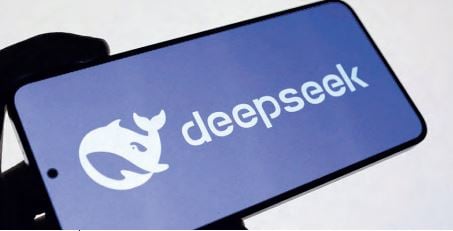

This small company is primed to elbow out industry giants and it’s evident the United States is gradually losing its dominance in advanced AI, while China—through companies such as DeepSeek—is poised to play a pivotal role in the technological revolution.
DeepSeek’s rise even caught the attention of President Donald Trump, who called it a “positive”, noting such progress can be achieved at a lower cost. He urged US tech giants to become more innovative to maintain global competitiveness.
The key takeaway from DeepSeek’s emergence is the shared understanding that stronger cooperation between Washington and Beijing in the technology field is essential for the global AI revolution.
Both the US and China are global leaders in nearly every aspect of human life, and friction between them can have polarising effects worldwide, disrupting global supply chains and impacting people globally.
For years, the US and its Western allies maintained the status quo in areas such as trade, technology, military power, and agriculture. However, China’s meteoric rise has shifted this balance, surpassing the US in several areas, and causing unease among the world’s established powers.
Moving beyond protectionism and embracing international cooperation will not only advance AI but also usher in a new era of responsible, inclusive technological progress. While competition between nations — especially between the US and China — is inevitable, it is critical that such competition remains responsible, avoiding conflict or confrontation.
With DeepSeek showcasing China’s rapidly advancing AI capabilities, it’s clear China is ready to challenge the US’s technological lead. The US can no longer isolate other nations in the AI revolution.
This apparent advance in Chinese AI capabilities comes after years of efforts by the US government to restrict China’s access to advanced semiconductors and the equipment used to manufacture them. However, these restrictions have had an unexpected outcome: spurring resilience in China’s semiconductor industry.
Domestic companies such as HiSense, Biren, and Semiconductor Manufacturing International Corporation have scaled up production capabilities, turning adversity into an opportunity for self-reliance.
Meanwhile, US chipmakers such as NVIDIA, Intel, AMD, and Qualcomm have suffered significant revenue losses due to diminished access to the Chinese market.
It is now imperative for both the US and China to engage in candid, constructive dialogue on AI. As global leaders, they must collaborate to address the risks associated with AI systems, improve AI safety and international cooperation, and promote the responsible use of AI for the benefit of all.
Unhealthy competition between Washington and Beijing over AI will be dangerous for humanity. If both sides opt for a confrontational approach, the risks associated with AI will remain unaddressed, exposing humanity to greater dangers.
For years, the US has imposed numerous export measures to throttle China’s AI development. However, DeepSeek appears to have innovated its way to success, developing more efficient algorithms that allow system chips to communicate with each other more effectively, thereby enhancing performance.
Historically reliant on the US for semiconductors, China found itself targeted by export restrictions—officially justified as national security concerns but widely seen as efforts to curb China’s technological rise.
Ironically, these restrictions have catalysed China’s resilience in the semiconductor sector, fostering domestic innovation. There is no need for the US and China to engage in cutthroat competition that disadvantages both sides in technological advancement.
The world has seen the technological prowess of both Washington and Beijing, and it’s time for them to compete healthily while collaborating in various aspects of the AI revolution to make it more effective.
As companies like DeepSeek demonstrate the ability to innovate with efficient algorithms, it’s clear that the era of using export controls to thwart technological advancement is outdated.
Open dialogue and consensus-building will be essential moving forward. The advancement of AI requires global collaboration. Given its multidisciplinary nature, no single nation can achieve all breakthroughs alone.
Cross-border data sharing enriches training datasets and improves model performance. International cooperation allows researchers to leverage diverse strengths in algorithms, computing power, and applications, accelerating innovation.
Moreover, addressing privacy, security, and ethical concerns requires a unified effort. By fostering open dialogue and cooperation, the global community can harness AI’s full potential for collective benefit.
Beyond semiconductors, China’s technological progress has reshaped global industries. It leads in 5G technology, with companies like Huawei and ZTE driving infrastructure deployment.
By the end of 2022, China accounted for more than 60 per cent of the world’s 5G base stations, benefiting countries in Africa, Europe, and Asia. For instance, South Africa’s Rain partnered with Huawei to launch Africa’s first commercial 5G network.
The US and China must compete fairly while striving for global progress. Other countries look to them for leadership, and if they view each other as rivals and engage in destructive competition, it will harm the entire planet.













